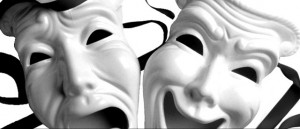High school workshops are even more interactive, expecting a high-level of student participation. 3-4 workshops a year will see the best results, as each one gets more intense and students get better and more confident in their speaking skills. Theatre workshops usually have a seasonal theme, depending on the time of year, that incorporates appropriate vocabulary and dialogue for the occassion. Often, we finish with a pop-song, always a favorite with teens and pre-teens.
Secondary Theatre Workshops: "SPEAK OUT!"

It’s interactive and participatory learning
Not just for students, but even for the teacher! For non-native teachers, it’s a great way to explore more difficult language and learn alongside your students and NOT get bored with those tiresome text books!
Gain confidence
Students gain confidence in themselves AND in speaking another language out loud in front of people. This is very important that they feel comfortable trying English in situations that are not typical classroom types.
It’s fun!
Kids, Teens and Adults enjoy themselves. As long as we’re having fun, we’re learning more than if we are tired and bored.
Native Imitation
Mimicking native speakers is the best way to communicate in another language. Even sounds (grrr, umph, knock-knock, cockle-doodle-doo, etc.), gestures and intonations are different.
Use of ALL language skills
Listening, reading, writing, repetition, pronunciation, memorization, intonation, accent, fluency- All helping overall communication. In theatre and acting, we can use ALL language skills. Depending on the activity, the teacher may be able to employ ALL the language skills into just ONE teacher preparation. You don’t need lots of extra materials or even traditional scripts.
Taking language risks INCREASES your students’ (and your) English capacity
ALL students, children, teens and adults, learn similarly to babies learning their first language. We DO NOT need the translation when a picture, gesture, description will help make the connection more vivid in the long run. If the word is not understood at first, that is OK. With repetition, the student eventually ‘figures it out’ in their own brain’s way- making cognitive connections that REALLY last. That is why songs, and picture books, theatre and movies has such an impact on language learning.

Wordpress themes JazzSurf

